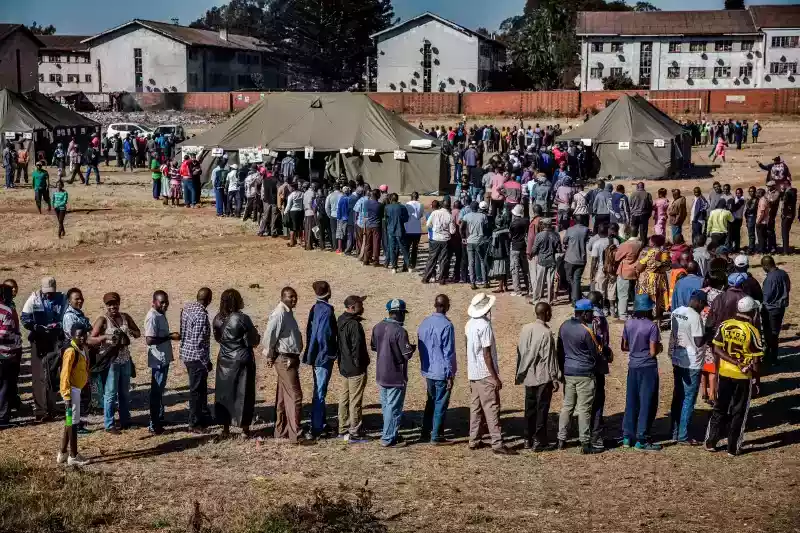
RANKED the continent with the most youthful population, Africa’s future with democracy rests on this youthful generation’s shoulders.
Africa faces a number of challenges in maintaining democratic governance with issues such as corruption and abuse of State power undermining the nature of democracy.
Civic education is said to provide the youth with the basic information and tools needed to engage in democratic processes.
The youth get to familiarise themselves with their rights, responsibilities and the workings of democratic institutions.
Democracy is the consensual relationship that the leader has with the led and this is a vital component of understanding what the true essence of democracy is and the youth get to bear witness of this through proper teachings and exercises that shape their destinies.
Democracy offers a peaceful way of understanding politics and societies and the youth need to note that the democracy they are currently witnessing is not exactly what was intended by the likes of Cleisthenes.
Civic education is vital in comprehending the ethos of democracy.
With civic education the youth are instilled with values such as respecting the rule of law, peaceful conflict resolution and developing a strong democratic culture.
- Mavhunga puts DeMbare into Chibuku quarterfinals
- Bulls to charge into Zimbabwe gold stocks
- Ndiraya concerned as goals dry up
- DeMbare fire blanks in drab draw
Keep Reading
Social harmony can be maintained through civic education and politics will not look like live war scenes.
The youths that benefit from this education are likely to participate in political activities and they go on to contribute to local and national governance where the youth’s voices cannot be ignored.
The present difficulty for the African youth is that democracy has become a mere ideological dream, democracy in Africa frequently feels like a borrowed garment, ill-fitting and unravelled at the seams.
There is something fundamentally wrong in Africa, which has convinced young generations that democracy does not work, African leaders’ continual reshaping of the wheels of democracy has reduced democracy to a simple electoral event rather than an on-going process of self-perfecting systems.
There is a lack of understanding, a knowledge gap due to lack of widespread civic education on the vital components of democracy.
Democracy is meant to be a give and take relationship, it is catering to the whims of the majority while willing to compromise for the minority.
The minorities must not be suppressed on the basis of numbers.
It must be a system that enshrines the protection and promotion of the human, civil and political rights, interests and welfare of the people.
One of the obstacles to this is lack of robust civic education for the youth.
Democracy is not just about elections, it is about cultivating an informed and engaged citizenry capable of holding leaders accountable.
Yet, across the continent, civic education for the youth remains underfunded, poorly implemented and often reduced to a superficial rhetoric.
Many youths view democracy as a distant concept, a colonial tool of oppression, irrelevant to their daily struggles.
This apathy is not innate but a result of systemic neglect.
When the future leaders, policy-makers and citizens are not educated about their rights and responsibilities, they are more likely to disengage from the political process, leaving the door open for authoritarianism and corruption.
In the absence of civic education, misinformation thrives often leading to a misguided population vulnerable to exploitation.
With more than 60% of the population being under 30, Zimbabwe’s’ youth demographic represents a vast pool of underutilised potential.
However, the absence of youth involvement in decision-making bodies, combined with a culture of tokenism, has contributed to many young individuals feeling alienated and helpless.
Economic challenges inevitably drive young people to prioritise survival over participation in civic matters, resulting in little time or means to engage in lobbying or civic engagement.
Socioeconomic marginalisation not only stunts individual potential, but also undermines the nation’s larger democratic fabric.
Regardless of these drawbacks, Zimbabwe has seen progress towards establishing policy frameworks and youth programmes to encourage young involvement.
The National Youth Policy (NYP) provides a road-map for addressing young people’s needs and facilitating their participation in governance.These policies prioritise youth empowerment, skill development and meaningful involvement in decision-making processes.
NYP emphasises the importance of civic education in providing young people with the information and skills required for engaged citizenship.
NYP has the ability to bring about enormous societal transformation in Zimbabwe.
Social change and constitutional reform are inextricably linked.
Just as social change may accelerate constitutional reform, the Constitution can also serve as a catalyst for social change, which includes increased civic youth involvement.
According to the policy, “Youth are the future of the nation and their empowerment is the key to development.”
However, it’s important to note that while these policies provide a strong foundation, their implementation has faced significant challenges.
NYP is multi-sectoral in nature, thus it demands strong co-ordination among all actors.
Therefore, its success hinges on effective implementation, adequate resources and the unwavering commitment of all key actors.
Youth service in Zimbabwe is a key intervention for youth civic and political development, aiming to build civic and political agency among young people while avoiding partisan indoctrination.
Civic education, a crucial component, equips youth with an understanding of their rights, responsibilities and roles in Zimbabwe’s socio-economic and political landscape, preparing them to be active citizens at the community, national and global levels.
Effective governance, emphasising principles like equality, inclusion and transparency, is essential for the programme’s success.
The relaunched programme should be truly national, independent and non-partisan, open to all qualified youth and embody values that benefit both the youth and the nation, promoting a non-violent, inclusive, and accountable approach.
Complementing these efforts, Unicef Zimbabwe’s Adolescents and Youth Strategy 2023-26 supports initiatives that help vulnerable youth to become active agents of change, focusing on equipping them with knowledge, skills and opportunities needed for social, civic and economic resilience.
The Youth Empowerment, Development and Vocational Training ministry further emphasises that youth service encourages national identity and civic responsibility, with core values like accountability reinforcing the importance of responsible citizenship.
Democracy relies on strong institutions, but institutions are only as strong as the people who uphold them.
Without a culture of civic responsibility, institutions become hollow shells, vulnerable to manipulation and decay.
To address these challenges, we must move beyond the usual prescriptions of good governance and transparency.
These are important, but they are not enough.
Instead, we need a more nuanced and context specific approach that addresses the catalyst causes of democratic fragility in Africa.
With this in mind one of the most effective instruments that can be used to bridge gaps in civic engagement in order to propel these programmes and agendas forward is technology.
In this digital age mobile apps, social media platforms and online learning platforms can bring civic education to life, especially for the youth, thus fostering a generation that is informed, critical in its reasoning and empowered to participate in shaping their future, fostering a culture of critical thinking and media literacy equips individuals to question, debate and resist manipulation.
Democracy in Africa must not decay to a mere a broken system but an evolving self-perfecting system, one that requires constant innovative and pan-African solutions rooted in the continent’s realities.
Munashe Dangare and Vuyelwa Mangena are final year students at Africa University, pursuing a Bachelor of Science with Honours in International Relations. They write here in the personal capacities.










